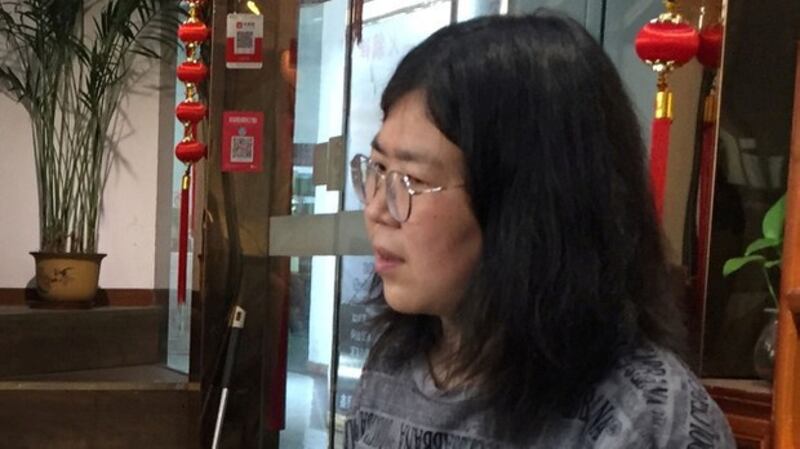Jailed Chinese citizen journalist Zhang Zhan has lost half her bodyweight since her detention in 2019, when she began an intermittent hunger strike in protest at her jailing.
Zhang, 37, was sentenced to four years' imprisonment by Shanghai's Pudong District People's Court on Dec. 28, 2020.
One of a group of citizen journalists detained, jailed or "disappeared" after they went to the central city of Wuhan to cover the early days of the COVID-19 pandemic, Zhang is eating very little food, rather than refusing it entirely, to avoid force-feeding by tube.
Zhang was sent for medical treatment at the end of July for malnutrition following several months of hunger strike in a Shanghai prison.
A friend of Zhang's mother surnamed Zhou said her mother is extremely worried about her health.
"She has been on a hunger strike since June 2020," Zhou said. "She used to weigh 150 pounds at a height of 1.78 meters, and now she weighs less than 80 pounds."
"That is half her bodyweight, so she could be in serious trouble," he said. "Zhang Zhan's mother is worried that her organs could start to fail, which could mean she won't survive."
Zhou said Zhang's refusal of food was out of protest at her illegal treatment at the hands of the authorities.
"She said while she was still in the detention center that she would continue her hunger strike, then she was transferred from prison to a hospital, where they tied her to a bed ... we think they may have force-fed her, along with other treatments; it can't be ruled out."

Zhang requested a discharge back to prison, and refused treatment, Zhou said.
"She left the hospital on Aug. 11, 2021, and went back to prison," he said.
Zhang's former defense attorney Ren Quanniu confirmed that Zhang is in very poor health, but that the authorities have denied repeated requests from her family for her release on medical parole.
"The government won't release her unless she makes a concession [to their demand for a forced confession]," Ren told RFA. "They don't proceed from a humanitarian standpoint ... that's their logic."
Zhang pleaded not guilty at her trial, where she appeared in court in a wheelchair. A guilty plea is typically a prerequisite for more lenient treatment in China's judicial system under the ruling Chinese Communist Party (CCP).
Beijing-based rights activist Hu Jia said he had had repeated applications for medical parole turned down while serving his three-and-a-half year jail term for "subversion," starting in 2008.
He said medical parole is treated differently in political cases.
"The authorities take a transactional view of parole in political cases," Hu told RFA. "I made continual applications for medical parole ... but was turned down."
He called on the international community to continue to raise concerns over Zhang's situation, as well as that of other Chinese political prisoners.
Translated and edited by Luisetta Mudie.
